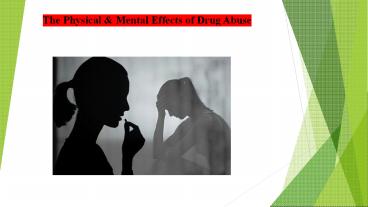The Physical & Mental Effects of Drug Abuse PowerPoint PPT Presentation
Title: The Physical & Mental Effects of Drug Abuse
1
- The Physical Mental Effects of Drug Abuse
2
- Drugs are chemicals that affect the body and
brain. Different drugs can have different
effects. Some effects of drugs include health
consequences that are long-lasting and permanent.
They can even continue after a person has stopped
taking the substance. - There are a few ways a person can take drugs,
including injection, inhalation and ingestion.
The effects of the drug on the body can depend on
how the drug is delivered. For example, the
injection of drugs directly into the bloodstream
has an immediate impact, while ingestion has a
delayed effect. But all misused drugs affect the
brain. They cause large amounts of dopamine, a
neurotransmitter that helps regulate our
emotions, motivation and feelings of pleasure, to
flood the brain and produce a high. Eventually,
drugs can change how the brain works and
interfere with a persons ability to make
choices, leading to intense cravings and
compulsive drug use. Over time, this behavior can
turn into a substance dependency, or drug
addiction.
3
THE EFFECTS OF DRUG ABUSE ON HEALTH
- Short-term effects
- Drugs are chemical compounds that affect the mind
and body. The exact effects vary among
individuals and also depend on the drug, dosage,
and delivery method. - Using any drug, even in moderation or according
to a medical prescription, can have short-term
effects. - For instance, c onsuming one or two servings of
alcohol can lead to mild intoxication. A person
may feel relaxed, uninhibited, or sleepy.
4
- Nicotine from cigarettes and other tobacco
products raises blood pressure and increases
alertness. - Using a prescription opioid as a doctor has
instructed helps relieve moderate-to-severe pain,
but opioids can also cause drowsiness, shallow
breathing, and constipation. - Abusing a drug, or misusing a prescription
medication, can produce other short-term effects,
such as - ? changes in appetite
- ? sleeplessness or insomnia
- ? increased heart rate
- ? slurred speech
- ? changes in cognitive ability
- ? a temporary sense of euphoria
- ? loss of coordination
5
- LONG-TERM DRUG ADDICTION EFFECTS
- The longer an addiction lasts, the more stress
and strain it puts on the individual. There is an
overwhelming number of long-term physical and
emotional effects addiction can have that can
easily turn a healthy man or woman into a frail
shadow of their former self. - Addiction is frequently intertwined with other
mental health issues, but this relationship
doesnt always have a clear directionality. For
example, people who suffer from mood or anxiety
disorders are almost twice as likely to also
suffer from a substance use disorder, and people
who suffer from substance use disorders are
approximately twice as likely to also struggle
with a mood or anxiety disorder.1 It isnt clear
which issue is causing the other, but the
relationship is strong nonetheless.1
6
Depression
- There is a clear association between substance
abuse and depression, as well as other mood
disorders.2 This relationship could be attributed
to pre existing depression that led to drug abuse
or it could be that substance use caused changes
in the brain that increased depressive symptoms.2
Some people use drugs to self-medicate symptoms
of depression, but this only alleviates the
symptoms while the user is high. It may even make
depression symptoms worse when the user is
working through withdrawal. Many drugs have a
withdrawal syndrome that includes depression or
other mood disturbances, which can complicate
recovery.
7
Anxiety
- Addiction is also associated with anxiety and
panic disorders.1 Again, the cause is difficult
to discern and can be different among
individuals. For one person, they could develop a
pattern of abuse after using drugs (e.g.,
benzodiazepines like Xanax) to cope with their
symptoms. Another person could have a
long-standing pattern of drug abuse and
consequently develop anxiety problems. Many
substances, particularly stimulants like cocaine,
can cause anxiety as a dose-dependent side
effects.3 Other drugs, like benzodiazepines, can
bring about increased anxiety as part of their
withdrawal syndromes.4
8
Paranoia
- Some drugs, like cocaine and marijuana, can cause
feelings of paranoia that may be amplified with
long-term abuse.3, 5 On top of this, people
struggling with addiction may feel that they need
to hide or lie about their substance use,
indicating a fear of being caught. The fact that
many substances of abuse are illegal can also
contribute to mounting feelings of paranoia among
long-term substance users.
9
Summary
- ? Drug abuse can affect several aspects of a
persons physical and psychological health. - ? Certain drugs can lead to drowsiness and slow
breathing, while others may cause insomnia,
paranoia, or hallucinations. - ? Chronic drug use is associated with
cardiovascular, kidney, and liver disease. ? In
addition to its physical effects, drug abuse can
affect physically and mentally in a person's life
who is suffering from the drug abuse. - ? Care providers should tailor treatment to a
persons needs. Community-based organizations and
state-funded treatment programs usually involve a
combination of behavioral therapy, group therapy,
and medication

